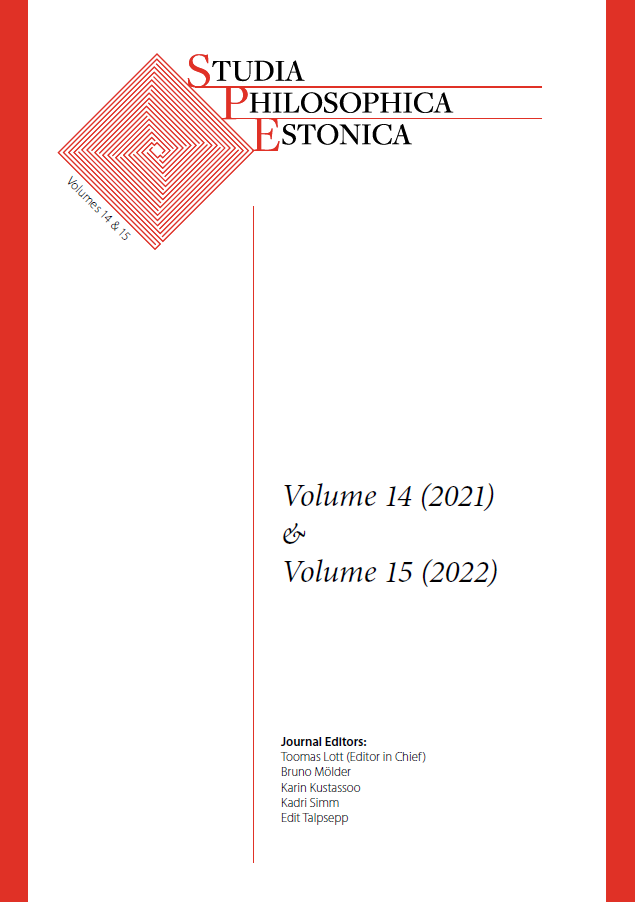Contrarian Conspiracy Theories and Higher-Order Evidence
A Modest Proposal
DOI:
https://doi.org/10.12697/spe.2022.15.02Keywords:
Conspiracy theories, higher-order evidence, epistemology, disagreement, social epistemologyAbstract
Is it always epistemically irrational to believe a conspiracy theory? Not on principle. According to the standard definition in the philosophical literature, conspiracy theories are too wide and heterogenous a class for us to proffer any universal rules re their rationality. This does not mean, however, that we cannot offer any useful generalisations. This paper argues that one useful generalisation concerns the contrariness of some conspiracy theories. Whilst we cannot say that it is always irrational to believe a conspiracy theory, ceteris paribus, it is irrational to believe a contrarian conspiracy theory.
A conspiracy theory is contrarian when recognised credible epistemic authorities reject that theory. When a conspiracy theory is contrarian the conspiracy theorist will, by default, possess negative higher-order evidence for the theory in question – that is, evidence that they may have made a mistake in the deliberations that led them to believe the relevant theory. In general, on acquiring negative higher-order evidence one acquires an undercutting defeater for whatever justification one otherwise has for the relevant beliefs. Therefore, absent a defeater-defeater, one will no longer be justified in holding the relevant beliefs. Applied to conspiracy theories, then, the consequences are simple enough. If a theory is contrarian, one will, by default, possess an undercutting defeater for whatever evidence on the basis of which one may have come to believe that theory. Absent a defeater-defeater for the relevant higher-order evidence, then, it is not rational for one to believe a conspiracy theory when that theory is contrarian.
References
Cassam, Q. (2019). Conspiracy Theories, Polity, [Amazon Kindle e-book].
Christensen, D. (2011). Disagreement, Question-Begging and Epistemic Self-Criticism, Philosophers' Imprint, 11.
Christensen, D. (2016). Disagreement, Drugs, Etc.: From Accuracy to Akrasia, Episteme: A Journal of Individual and Social Epistemology, 13(4): 397-422.
Coady, D. (2007). Are Conspiracy Theorists Irrational, Episteme-a Journal of Individual and Social Epistemology, 4(2): 193-204.
Dentith, M. R. X. (2022). Suspicious conspiracy theories, Synthese, 200(3): 1-14.
Dentith, M. R. X., & Keeley, B. L. (2018). The applied epistemology of conspiracy theories: An overview, in D. Coady & J. Chase (eds.), Routledge Handbook on Applied Epistemology Routledge, New York, pp. 284-294.
Elga, A. (2007). Reflection and Disagreement, Nous, 41(3): 478-502.
Harris, K. R. (2022) Conspiracy theories, populism, and epistemic autonomy, Journal of the American Philosophical Association: 1-16.
Keeley, B. L. (1999). Of conspiracy theories, Journal of Philosophy, 96(3): 109-126.
Kelly, T. (2010). Peer Disagreement and Higher‐Order Evidence, in R. Feldman & T. A. Warfield (eds.), Disagreement, Oxford University Press, Oxford, pp. 111-174.
King, N. L. (2016). Religious Skepticism and Higher- Order Evidence, in J. Kvanvig (ed.), Oxford Studies in Philosophy of Religion: Volume 7, Oxford University Press, Oxford, pp. 126-156.
Lackey, J. (2010). A Justificationist View of Disagreement's Epistemic Significance, in A. Haddock, A. Millar, & D. Pritchard (eds.), Social Epistemology, Oxford University Press: Oxford, pp. 298-325.
Lasonen‐Aarnio, M. (2014). Higher‐Order Evidence and the Limits of Defeat, Philosophy and Phenomenological Research, 88(2): 314-345.
Levy, N. (2007). Radically Socialized Knowledge and Conspiracy Theories, Episteme-a Journal of Individual and Social Epistemology, 4(2): 181-192.
Matheson, J. (2015). The Epistemic Significance of Disagreement, Palgrave Macmillan, New York
Pigden, C. (2007). Conspiracy Theories and the Conventional Wisdom, Episteme, 4(2): 219-232.
Pigden, C. (2018). Conspiracy Theories, Deplorables, and Defectibility: A Reply to Patrick Stokes, in M. R. X. Dentith (ed.), Taking Conspiracy Theories Seriously, Rowman & Littlefield, [Amazon Kindle e-book], pp. 203-215.
Pollock, J. L. (1986). Contemporary theories of knowledge, Rowman & Littlefield, London
Räikkä, J., & Basham, L. (2018). Conspiracy Theory Phobia, in J. E. Uscinski (Ed.), Conspiracy Theories and the People Who Believe Them, Oxford University Press, Oxford, pp. 178-186
Schafer, K. (2015). How Common is Peer Disagreement? On Self‐Trust and Rational Symmetry, Philosophy and Phenomenological Research, 91(1): 25-46.
Sunstein, C. R., & Vermeule, A. (2009). Conspiracy theories: Causes and cures, Journal of Political Philosophy, 17(2): 202-227.





